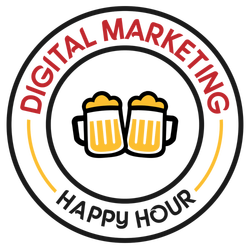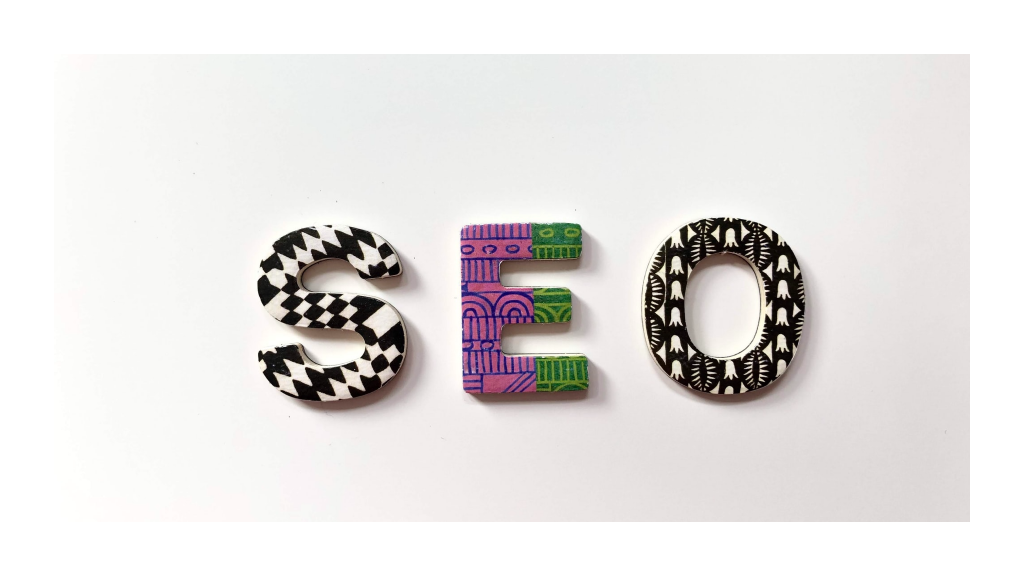Digital Marketing Happy Hour · Episode 6: SEO and Content Marketing
You know content is important, but how do you know what content to create? What tools should you use to evaluate how your organic strategy is performing?
Here are a few excerpts from the SEO and content episode:
- Chris Casale: [00:03:13] anytime you go into an economic downturn. One of the first things that gets cut is the marketing budget. Now, we can have a whole other podcast dedicated to whether that’s the right approach or not. But it is a fact marketing budgets get cut during times like this. So how do you know what content to produce? If you’ve got less marketing budget, maybe your paid campaigns are not going to be able to deliver at the same rate they were. The only thing you can turn to is search engine optimization, a strong organic strategy. We figured the best way to delve into this this week was to focus on two areas. The first being, you know, the content marketing side of search engine optimization, how to know what content to create and then dissemination of that content or what’s known as off page SEO essentially link building and getting traffic traction for the topics that you create. [00:04:04]
- Ryan Smith: [00:05:13] Quality is much better than quantity, the quality being what it’s going to add value to your end user. What is also going to get some sort of engagement.
- Ryan Smith: [00:06:13] The main reasons for creating this content is to add value, to get that engagement. And in the end, hopefully, you get those sort of inbound links. Again, those inbound links come from third party, other websites linking to your website. And again, the whole point of that is, is because you have now that authority, you’ve shown that expertise and you have built that trust, which Google has, by the way, that acronym is E-A-T: Expertise, Authority and Trust. When you have that, that kind of content is what helps propel you and you rise in the rankings organically. So, again, don’t create content for the sake of content.
Creating content for the sake of adding more content to your website is not the answer.
- Chris Casale: [00:07:58] I think one of the keys to remember is it’s all about delivering that value. If you could deliver value in 200 words, great. That’s content. If it takes 1,500 words, that’s fine, too. If it takes a 15 minute video or a 30 second video. It doesn’t matter. The length is appropriate to whatever expertise you’re trying to demonstrate. In some cases that might be very short and others that might be very long. So if you focus on value at the core, that’s going to help you achieve the level of success you’re looking to with the content.
- Chris Casale: [00:09:13] I think if you focus too heavily on sales, you’re going to very quickly turn people off. We talked about this in one of the earlier podcasts as well. This idea that if you’re, you know, sell, sell, sell all the time, you know, think about it from your own perspective. Do you want to be bombarded with ads? Do you want to be bombarded with aggressive sales? The answer is no. None of us do. We’ve got very limited amount of attention and we don’t want to have that disrupted with, you know, buy, buy, buy mentality. So, no, the answer to that is, you know, I want to go. I want to learn. I want to acquire information. And maybe that information is just information that helps me make a better buying decision. But I want to be able to absorb content that helps me learn something rather than have something forced down my throat.
How can my content add value and what types of content should I create?
- Ryan Smith: [00:10:12] So what adds value? Well, value is a little different to everybody. One thing that I think you can say is unanimous is something that is educational. If I can come and read your blog post, listen to your podcast, watch your video on YouTube, on Instagram, and I come away with something that I have learned all of a sudden now that’s what adds value. So just to clarify, when we say add value, that’s what we’re talking about.
- Ryan Smith: [00:10:44] You need to focus on customer needs. Does your content pass? Will this help my customers? Will this help my audience test? You need to get their feedback. So there’s a couple of ways you can get their feedback. You can if you have an email list, you can send out surveys asking them. You can do it through social media. If you run a Facebook group or if you are in this professional’s Facebook group, maybe you don’t own it. You’re not the admin, but there’s a large group in it. Ask a question that, you know, maybe your ideal customer avatar as in your I.C.A. Right. What is it that they need? Throw it out there as a question and just watch the comments, see what people are, survey the comments, see what they’re saying. Take notes on everything. Now, you now have a better understanding of what your customer’s needs are.
- Chris Casale: [00:11:58] I think the way to deliver some element of sales in in the content that you’re developing. Right. You’re in a business that provides a service or perhaps you develop a product and you’re serving a particular audience. Right. So you just gave the advice of listening to your audience to determine what they need so you can build content. That’s according to their needs. Well, in addition to that, you have competitors in the space, right. So what is it that’s relatively unique to you? What is it that you do that your competition does? If there’s a way to weave that into the content delivery right now, you’re putting your unique spin, your unique brand on it for that audience.
When should you focus on PPC ads compared to SEO content marketing?
- Ryan Smith: [00:16:32] If you want to get to the number one search engine results page 100% of the time, I’m going to tell you or maybe I should say 99% of the time, I’m going to tell you do a PPC campaign, because you know what? Potentially, in one hour, I can have you from nobody heard of you to the number one ranking on those keyword phrases. Now, you can’t take that same concept apply to SEO because SEO is the marathon. While that paid advertising is the sprint. So when you’re talking about the long game, the marathon, you have to think long term in developing your content. You also have to manage your expectations for long term and not the short term. So while we’re going through, you know, turbulent times, you could have a bunch of employees that have been rift, furloughed, skeleton crew, whatever you call it. It’s important to create that content and publish that content, knowing that you’re not going to see immediate results potentially, depending on your industry right now, but plan for the future plan down the road, six months, nine months down the road. And the one thing we know is with SEO, the organic the free content, has way more sustainability than you’ll ever get with content that you produce strictly on paid, because paid is like a light switch when you turn it on I can get you at the top of the page. When you turn it off it’s gone forever.
Rate, Review and Subscribe to the Digital Marketing Happy Hour Podcast
If you feel like you learned something of value or maybe laughed a little, would you please consider leaving a rating and review?
Finally, if you haven’t done so already, please subscribe to the podcast, so that you don’t miss another episode. It’s a seamless way to stay informed and up-to-date on digital marketing.
Subscribe





